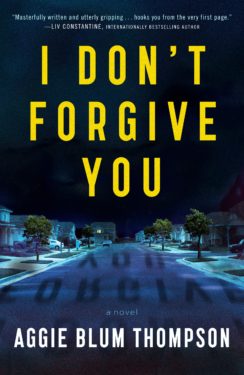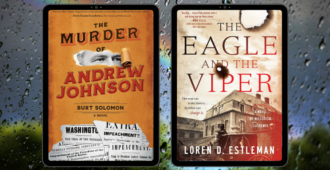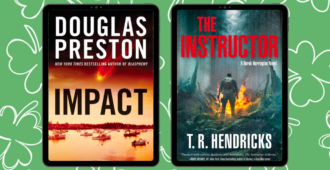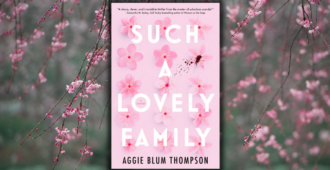Before Aggie Blum Thompson became an author, she was a real-life crime reporter, and also wrote for papers like The Boston Globe and The Washington Post.
Now she’s moved from covering crime to making it up in her debut novel I Don’t Forgive You, headed to a bookstore near you on June 8th! To get you ready for this page-turning domestic thriller, Aggie joined us on the blog to talk about her experience as a crime reporter!
By Aggie Blum Thompson
I had been on the job less than one week when I encountered my first murder victim. He was lying on the cement outside of a neighborhood market in the small Southern city of Wilmington, North Carolina, the victim of a drive-by shooting.
This was my first newspaper job.
I was hired as the local paper’s “cops” reporter, although I quickly learned not to use the word “cop” to reference a law enforcement officer. My beat was to cover the goings-on at both the city’s police department and at the county sheriff, handling everything from budget issues to crime, including, yes, murder. I knew about the murder part in theory, but as I parked my car in a dark and unfamiliar area of Wilmington, I was jittery. Would I know what to do? Would the police respond to me, or completely ignore me? What about the crowd that had gathered, at least ten people deep, agitated and restless – would they resent a reporter in their midst?
And most of all – would I make the newspaper’s deadline of eleven o’clock, seeing as it was after ten-forty when I arrived?
I parked behind a line of squad cars, pretty far away from the crime scene. Pushing my way through the crowd was like bushwhacking through the woods and then coming upon a clearing. Only this clearing was dirty cement, where a man lay. Around him, yellow plastic markers indicated where bullets had been found. The photographer was just finishing up, and the medics were ready to take the body to the morgue. I managed to get the attention of a mustachioed, middle-aged man who looked like he was in charge. I introduced myself, and he informed me he would be all mine once they were done, happy to answer any and all questions. He called me ma’am.
Feeling relieved, I sank back into the crowd to wait. Little did I know he was ma’aming me — a specifically Southern skill that law enforcement use to their advantage. While appearing polite and respectful, they completely blowing you off.
I called in the basics of the crime — what, when, where, how — to the copy desk, but I did not have a who or why. I wanted a name, or an occupation, or at least an age. Something to make this person lying crumpled on the concrete a human. Without it, he would be known in tomorrow’s paper as “Murder Victim.”
The medics took the body away. I motioned to the police detective and he smiled, but did not approach. The crowd began to dissipate once the body was gone. Soon it was me, a few stragglers, and various law enforcement technicians. I interviewed a few bystanders to keep busy. Someone in a uniform took down the yellow police tape that had cordoned off the scene of the murder. Someone else came and collected those little yellow plastic bullet markers. The copy desk called, impatient now. It was after eleven. They needed that humanizing detail now.
I searched the scene for my detective but could not see him. I approached a uniformed officer and asked where he might be. He shrugged. “He left a while ago.”
And then I was all alone, the crowd gone, the police gone, the body gone.
It was pitch black. My car was blocks away, but without the emergency vehicles, I couldn’t remember which street I had parked on. I fumbled around in the dark until, heart racing, I finally located my car. It wasn’t until the next day that I found out that man’s name. But my editor said it was too late to put it in the paper—it was yesterday’s news.
Years later, I’ve traded in newspaper reporting for novel writing. I’m still writing about murder, but I no longer depend on anyone else to tell me the who, what, when, where or why. I am limited now only by my imagination.
Pre-order a Copy of I Don’t Forgive You—available June 8th!













It is so exciting that she has been able to turn her experiences into a fictional story that goes beyond the headlines. This book is going to be a winner!